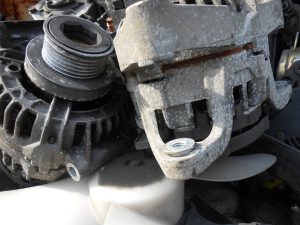
Your Ford alternator has only a few parts but is connected to various systems and is essential in keeping the battery charged. A failing alternator will cause many problems. Watch out for the following symptoms to determine if you need to take your Maverick, EcoSport, or Escape for an alternator repair at your Ford dealer.
The Battery Warning Light Is On
A problem with the alternator will trigger the battery warning light on your dashboard when the voltage fluctuates below or above a pre-set limit. The light might flicker on and off when you use accessories or turn on your headlights. The more power is needed, the harder the alternator works to maintain the necessary voltage, and a malfunctioning alternator can’t meet the demands, triggering the battery warning light.
Your Headlights Dim and Flicker
An alternator fulfills your car’s electrical needs, and when there’s a problem, it will cause issues with your headlights. The headlights will dim and flicker or grow from dim to bright, then dim again when you accelerate or use any of the accessories. The alternator can’t generate enough power to keep the lights on consistently while the accessories are running.
You Struggle With the Accessories
A failing alternator will cause all sorts of glitches, and you’ll experience all kinds of issues simultaneously. Your windows and windshield wipers will move slower, and your sunroof might get stuck. To prevent complete alternator failure, use your car’s accessories as little as possible until you can get repairs done.
You Smell Burning Electrical or Rubber Odors
Burning rubber or electrical odors are signs of alternator trouble. An overworked alternator pushes too much power through, heating the wires, and causing the burning electrical smell. A pulley that’s not aligned or not properly turning can create more friction on the rubber belt, creating heat and emitting a burning odor. Remember that your alternator can still fail even if you don’t smell these odors.
You Hear Whining or Growling Noises
Certain sounds can warn you when there’s a problem with your car’s alternator. If the belt is misaligned or the bearings or bushings are worn, it will make whining and growling noises. Your alternator could be on its way out when you hear whining or growling noises.
Your Car Battery Is Dead
When your car doesn’t want to start, it’s not technically an alternator problem, but a failing alternator can kill a battery. When there’s a problem with the alternator, your battery, not designed for long-term power use, takes up the slack and eventually runs down, leaving you stranded next to the road.
To determine if your battery or alternator is causing the problem, jump-start your car and remove the jumper cables as quickly as possible. If your alternator fails to charge the system, your vehicle will die, and if your car runs, the battery is the culprit.
If you struggle with alternator problems, call Bob Maxey Ford now for repairs. The certified Ford technicians will expertly repair your alternator and get you back on the road in a flash.
Image by SmartRecycling from Pixabay



